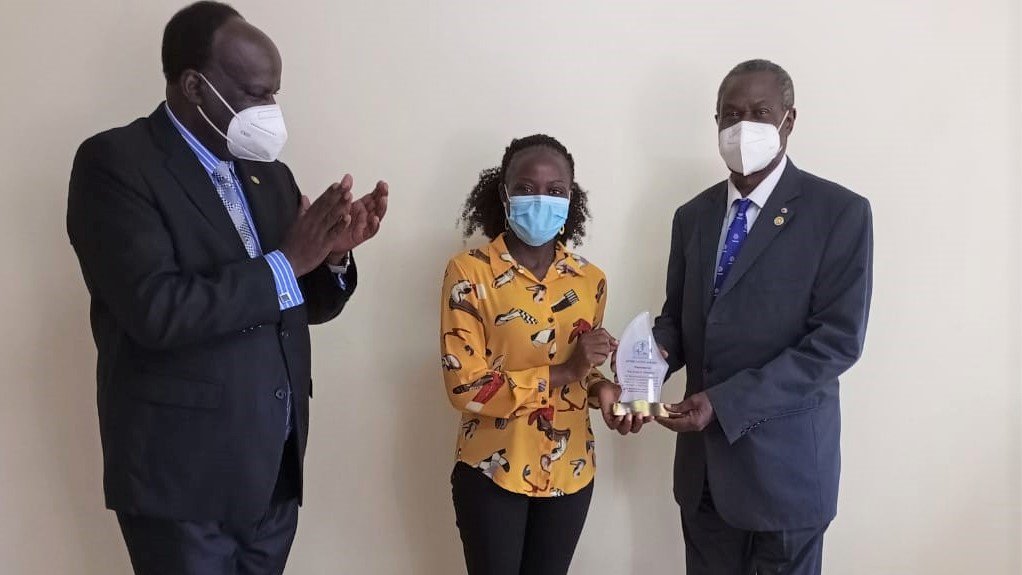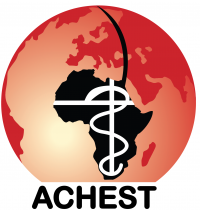Congratulations to Prof . Elsie Kiguli-Malwadde
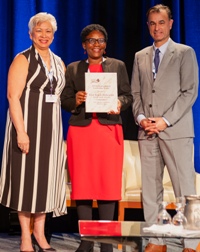
Congratulations to Prof . Elsie Kiguli-Malwadde, Deputy Executive Director/ Director Health Workforce Education and Development at ACHEST and Editor of the Africa Health Journal.
Prof Elsie Kiguli-Malwadde received the Consortium of Universities of Global Health (CUGH) Distinguished Leadership Award In Los Angeles USA in March 2024.
Each year the Consortium of Universities for Global Health acknowledges the accomplishments and commitment of outstanding individuals who contribute to the advancement of global health worldwide via our CUGH Global Health Leadership Awards.The Distinguished Leadership Award honors a global health leader who has “made an exceptional contribution to improving global health, through interdisciplinary activities across research, education, advocacy and/or service.” Awardees have also shown outstanding leadership resulting in lasting global health outcomes.
Need for and Development of an Intern Health Professions Handbook in Uganda
Health professions internship is the transition phase between being students to independent practitioners within the health system in many countries. Interns acquire the required practical
skills in clinical, communication, and administrative matters that enable them to register as members of the health profession. In Uganda and other countries, an internship is the first time these individuals have the responsibility of taking care of patients under minimal supervision. It is widely recognized as a very busy and challenging experience. The stress of an internship can lead to burnout, mental health problems, and poor patient care. In light of this, educators, regulators, and employers have come up with courses to address this challenge and help trainees build self‑confidence and professional identity, maintain life balance, connections, and emotional responses, manage expectations, and facilitate teamwork. These types of courses have not been offered in Uganda, possibly due to limited resources. In this article, we describe an internship induction program that incorporates an Intern Health Professions Handbook,entitled “Handbook for Induction of Health Professions Interns in Uganda.”
Need for and Development of an Intern Health Professions link for the full article
Francis Omaswa, ACHEST Director of Special Projects and Resource Mobilization Participates at Ministry of Health and Community Health Partners Retreat in Kalangala, Uganda
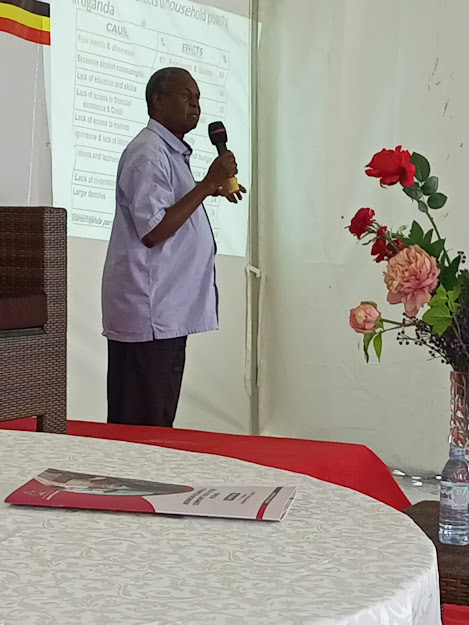
The Director Special Projects and Resource Mobilization at ACHEST, Prof Francis Omaswa, was the Keynote speaker at retreat organized by the Ministry of Health for all the partners in the community health space in Uganda that took place on October 3rd to 7th 2022 in Kalangala, District under the theme “ADVANCING REALIGNMENT OF COMMUNITY HEALTH SYSTEMS IN UGANDA”. Prof. Omaswa emphasized that in order to achieve alignment it was essential for Government and Partners to operate under the “Three Ones” namely: One Work Plan, One Implementation Plan and One Monitoring and Evaluation Plan. Implementation should be led by the country while Resources can come from multiple sources and monitoring is undertaken jointly.
There was unanimity in the meeting that strong community health systems which are people centered and led working with community health workers (CHWs) have enormous potential to achieve UHC with available resources.
In his message, Prof. Omaswa talked about the Universal Declaration of Human Rights: everyone has the right to a standard of living adequate for the health and well-being of himself and of his family, including food, clothing, housing and medical care and necessary social services, and the right to security in the event of unemployment, sickness, disability, widowhood, old age or other lack of livelihood in circumstances beyond his control.…
He further emphasized on the Sustainable Development Goals and UHC: Achieved through UHC that “leaves no one behind” so that “All people obtain the good-quality essential health services they need without enduring financial hardship”. He reminded the meeting of the Alma Ata Declaration that the existing gross inequality in the health status of the people, particularly between developed and developing countries as well as within countries, is politically, socially, and economically
unacceptable. The people have a right and duty to participate individually and collectively in the planning and implementation of their health care.
Prof. Omaswa, who is also the former Director-General Health Services in the Ministry of Health reminded the partners about his message “Health is made at home: Health is made at home and only repaired in health facilities when it breaks down. Be clean, eat well, and do not share accommodation with animals. This is a message from the Director General of Health Services” (Omaswa 1999- 2005).
In the presence of the Permanent Secretary Ministry of Health Uganda Dr. Diana Atwine, Prof. Omaswa pointed out the issue of Political Will and Public Will for Managing Social Change: To achieve success, the government and large segments of the public must be willing to recognize the problem, understand the problem in a similar way, and agree on solutions. Also embedding Health in Governance should be the correct way to go as routine governance of society should be the foundation of the health system this by ensuring that laws, regulations and good practice are complied with by all.
Speaking at the retreat, Prof. Omaswa shared the lessons learnt while working with VHTs in the four districts of Mukono, Busia, Ngora and Amuru where ACHEST has been implementing community engagement activities before and during COVID-19:
• Organized Communities capable of owning and taking responsibility for their health and achieving Social Cohesion through regular Community dialogue sessions – “Ainapakina”.
• Organized communities improve relations with the health facilities and the performance of the community health system and PHC
• Equipping, training, supervising and paying VHTs (CHWs) is essential for them to perform their roles effectively.
• District health plans should be developed and implemented using bottom-up and “three ones” approach. Integration with PDM.
• District Health performance benefits from regular Supportive Supervision from the Center
In conclusion Prof. Omaswa made a call to action and an appeal to the participants that “Unless we in Uganda, Individually and Collectively feel the pain and the shame of poor Health Services, we will not have the Commitment to take the needed Actions to correct our Situation”. Do we care as public servants and employees of Partner organizations?.
Compiled by Charles Imalingat Information Technology and Communications Specialist, ACHEST
ACHEST ED INSTALLED AS PRESIDENT OF THE ROTARY CLUB OF KAMPALA
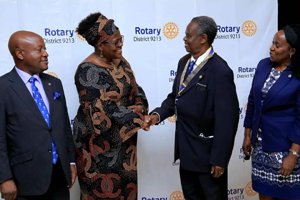
The ACHEST Executive Director, Prof Francis Omaswa has been installed as the new President of the Rotary Club of Kampala. The installation ceremony was conducted by Rotary District Governor Mike Kennedy Sebalu and Ann Owor Nkutu District Governor Nominee. It was attended by the WHO Country Representative Yonas Woldemariam and the Executive Director of the Kampala Capital City Authority Dorothy Kisaka.
The Club is the oldest Rotary Club in Uganda having started in 1957
Prof. Omaswa was installed as President on June 30, 2022 in a colorful ceremony held at the Sheraton Kampala Hotel. He will lead the club from 1st July, 2022 until 30th June, 2023. He replaces Henry Rugamba who has led the Club since July 2021. …
In his speech, Prof Omaswa pledged that the Club would continue taking deliberate efforts aimed at improving the health, water and education sectors. He also said he plans to start the new Rotary Club of Ngora district, his hometown, where young people can get involved.
Prof. Omaswa spoke against the moral decay in society and urged Rotarians to be exemplary in their work.
He also underscored his famous quote, “Health is Made at Home and is only repaired in hospitals when it breakdown” to encourage individuals to take primary responsibility for their health.
Related media links:
https://www.ntv.co.ug/ug/news/rotary-urged-to-take-lead-in-promoting-vaccination-3865418
https://www.newvision.co.ug/category/business/prof-omaswa-installed-as-kampala-rotary-club-137534
ACHEST CO-HOSTS THE “MAKERERE AT 100” SYMPOSIUM

“Let us use the opportunity of the Centenary so that Makerere University College of Health Sciences remains the vanguard that will pull all the other health professions training institutions into the future.”
This appeal was made by the ACHEST Executive Director, Prof. Francis Omaswa while addressing the Symposium on advancing Health Professions Education(HPE) in Uganda on 16th June 2022.
The Symposium was organized by the College of Health Sciences (MakCHS) in collaboration with ACHEST, to commemorate 100 years of Makerere University. It was sponsored by sponsored by the Health Professions Education Initiative (HEPI). …
Prof Omaswa gave a keynote address on the Global Health Workforce Crisis which is characterized by widespread shortages, maldistribution, and poor working conditions. He noted that the impact was particularly distressing in the developing countries which are not able to employ and retain its skilled workforce.
“ It is going to be a big problem. If we can’t employ our people, other countries are going to take them away,” he said, calling on the government to make deliberate efforts to invest in the health workforce.
Prof Omaswa also talked about the competencies that health professions graduates must have including being prepared to work where the services are most needed, ability to respond to the health needs of the community and delivery of quality care with the available resources, being innovative so as to provide solutions and being change agents.
He called for funding of regulatory bodies such as the Uganda Medical and Dental Practitioners Council(UMDP), Professional Associations so that they can support supervision of health professions. Also emphasized was the need for multisectoral country partnerships and financing a comprehensive Health Sector Strategic plan.
Prof Omaswa strongly stated that academic institutions have the power to move things if they are better organized.
“We must find a way in which the teaching institutions have a role in the planning of the country. Let’s stop grumbling and act. If we act together, we will be heard. Let’s be the change makers or change agents whom we want to train,” he added.
Prof Omaswa was also a panelist alongside ACHEST Director Health Workforce Dr. Elsie Kiguli-Malwadde , Prof Jehu Iputo (Busitema University), Prof Joel Okullo (Chairperson UMDPC) and Prof. Sarah Kiguli (MakCHS and Principal Investigator of HEPI) and Prof Mary Okwakol (National Council for Higher Education. Panelists discussed issues on quality of training, regulation and accreditation of programmes, the need to revise the curriculum and health worker competencies. The highlight was the power of partnerships, as demonstrated by HEPI at Makerere University, which is working to strengthen interdisciplinary health professional education and research training in order to produce graduates with competencies that will address the health needs of the population
Other speakers included Dr Roy Mubuuke-Gonzanga who chaired the first session of the symposium, the Principal MakCHS Prof. Damalie Nakanjako and Prof Buyinza Mukadasi a representative from the Vice Chancellor’s office who gave the welcome and opening remarks respectively.
The Symposium was also graced by Prof. Josephine Namboze, the first woman in the region to train as a medical doctor. The audience listened with rapt attention as she narrated her inspiring story as a young undergraduate student.
“ When I was attending medical school, everybody knew everybody else. The numbers were small. The lecturers were all white,” she recalled.
She strongly recommended that the HPE institutions must put in place gender sensitive infrastructure. “put in place facilities for women because medical school is no longer just for men,” Prof Nambooze advised.
Prof. Nelson Sewankambo, the Former Principal at MakCHS made a presentation on HPE in Uganda, the past, present and future. He called for a mindset change to tackle emerging and future public health crises. “COVID 19 gives us a platform to think differently,” he noted.
The ACHEST Deputy Director Dr. David Okello chaired the second session and panel comprising of Prof Pius Okong ( Health Services Commission), Elizabeth Ekong Namusoke( Uganda Midwifery and Nursing Council) and Dr. Musa Lumumba, the President of the Federation for Uganda Medical Interns. Discussions centered on the working conditions and welfare of the health workforce and current challenges and opportunities in staffing and absorption of skilled personnel.
Dr. Rhoda Wanyenze the Dean the School of Public Health summarized the compelling issues of the day. Among the key points of action was creating a forum on HPE in Uganda, and the need to have an evidence-based analysis of the current health workforce situation in Uganda. Participants also resolved that they would have another meeting in September and should be prepared to meet the President on issues discussed.
“The ball is on our court,” remarked Prof Annette Nakimuli, the Dean of the School of Medicine in her closing remarks.
END
ACHEST HOSTS THE SECOND INTERNS INDUCTION SESSION FOR 2022
Over 100 newly qualified medical doctors, nurses and pharmacists participated at this year’s 2nd Interns Induction Course hosted virtually on May 12, 2022, by ACHEST in partnership with the Ministry of Health and Health Professions Education Initiative (HEPI) and Makerere University College of Health Sciences.
This was a follow-up of the face-to-face induction course held earlier on April 29th, 2022 which also highlighted the launch of the Handbook for all Health Professions Interns in Uganda.
Similar induction sessions have been hosted for 4years now with the objective of enabling the young professionals to be conversant with the Ugandan health system and the Ministry of Health Vision and Mission; to understand the structure and requirements of public service and quality assurance in the health care system. Other objectives are to ensure that the new cohorts of interns are prepared to work in the Ugandan health system and understand the referral system, job market, career progression and postgraduate training; and how to take good care of themselves to avoid burn out and stress.
In her opening remarks, ACHEST Director Health Workforce Dr. Elsie Kiguli-Malwadde reflected on the life cycle of a health worker, the role of internship and how the graduates can use it an opportunity to become fully fledged health professionals. “After internship, you will be expected to be an icon, a health worker that improves health outcomes. Internship can be busy and challenging but it is also be exciting,” stated Dr. Kiguli-Malwadde. …
The ACHEST Senior Consultant, Dr. Vincent Ojoome spoke about quality assurance in healthcare with an emphasis on the standards of care and doing the right thing at the right time for the right person. He noted that quality assurance is about continuous improvement – “continuously do things better all the time until they are done right the first time all the time,” he stated
Cliff Aliga, a critical care nurse and Senior Lecturer at Aga Khan Hospital made a presentation on nursing competencies and practices globally. He emphasized ethics and professionalism, accountability, adaptability and communication and the need to mentor and coach junior colleagues. “When we talk about quality nursing, we are talking about patient safety,” he said.
Prof. Richard Odoi Adome, from the Department of Pharmacy at Makerere University presented a paper on medicine use and patient safety. His presentation highlighted the likely causes of medical errors, sometimes resulting from confusion in tradenames of medicines, incorrect prescription, poor handwriting, dispensing errors such as failure to check the patients identity at the counter and irrational combinations to mention but a few.
Many health professions had questions about the public service and this topic was handled by a Ministry of Health Assistant Commissioner Human Resources Management who explained in detail the structures of the government and the health system, as well as the professional conduct expected while at work.
In an era of the COVID-19 Pandemic, it is important to reflect the impact it has had on the health workforce . The ACHEST Deputy Executive Director Dr. David Okello spoke about the need for empathy and compassion towards frontline health workers. He noted that during the peak of the COVID 19 Pandemic, they had to work for long hours due to the high number of Covid-19 patients. This is in addition to the existing challenges that the workforce was facing before the pandemic such as poor working conditions. He urged the health professionals to look out for each other in order to avoid mental breakdown and for supervisors to address the problems identified.
The concluding remarks were by the ACHEST Executive Director Prof. Francis Omaswa who reminded that participants that health is a noble profession and they should be proud of joining it. “ Being a health professional, you become part of the global community. You will find easily that you have friends all over the world that you get to know through the high quality of your professional work,” said Prof. Omaswa.
The Interns Induction Course is globally recognized having received an Honorable Mention in the 2020 Health Workforce Resilience Awards by the Human Resources for Health 2030 program
End.
HANDBOOK FOR HEALTH PROFESSIONS INTERNS LAUNCHED
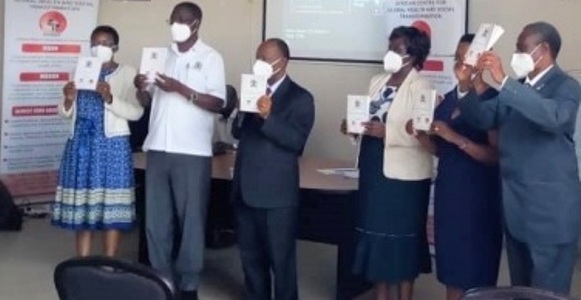
ACHEST in partnership with the Health Professionals Education Initiative(HEPI) at Makerere University College of Health Sciences and the Ministry of Health has launched a Handbook for Health Professions Interns in Uganda.ACHEST, Ministry of Health and Director Mulago hospital during the launch of the Intern Hand Book
The Handbook will be a guide to newly qualified professionals as they take the one-year mandatory internship at different hospitals and health facilities n Uganda. It addresses the key issues that graduates face as they transition from being students to fully-fledged professionals, from the expectations of internship, to career growth and professional development, the role of professional associations, stress management, and global health perspectives. Other topics covered are: Joining the Public Service in Uganda, The Health System in Uganda, Quality Assurance in the Health Care, Practical experiences and life during the internship, and Nursing Competencies.…
This Handbook was officially launched on April 29, 2022, by the Director-General Health ServicesMinistry of Health. Dr. Henry Mwebesa, during the Induction Course for this year’s cohort of interns.
The event held at Mulago Women’s Specialized Hospital was also streamed online to enable all the interns listen in from their different training sites across the country. This year, there is a total of 1,795 interns currently under training 1,795 (doctors 900, dentists 31, pharmacists 253, nurses 466 and Midwives 145).
Dr. Mwebesa stated: “The handbook addresses issues facing graduate professionals during internship. It’s a good resource book for induction of our interns prior to internship training, and a good reference material for them during internship.”
He commended ACHEST and HEPI for working very closely with the Ministry of Health develop the handbook.
Special appreciation was also conveyed to HEPI for funding the development process of the Handbook and the induction courses that have been held for the last 3 years.
These Courses were selected for global recognition in the Health workforce Resilience Awards hosted in 2020 by the Human Resources for Health 2030 Program.
Other speakers at this year’s Induction Course included ACHEST Executive Director Prof. Francis Omaswa, ACHEST Director Health Workforce Prof Elsie Kiguli-Malwadde, HEPI Principal Investigator Prof Sarah Kiguli, Commissioner Nursing Sr Beatrice Amuge, Commissioner Clinical Services Dr. Jackson Amone, Mulago Hospital Executive Director Dr. Rosemary Byanyima, Psychiatrist Dr. Raymond Odokonyero and a representative from the Uganda Medical Association Musa Lumumba.
The Outgoing President of the Federation of Medical Interns in Uganda Dr. Lillian Mary Nabwire also participated by describing her real-life experience of internship at Masaka Hospital, as well as different perspectives from her classmates at their internship placements.
It was an interactive session with interns freely talking about the challenges they were facing including issues on welfare and supervision; the experts provided responses to queries raised.
Compiled by Carol Natukunda, ACHEST Communications Specialist ACHEST
A HANDBOOK FOR HEALTH PROFESSIONS INTERNS IN UGANDA
ACHEST RECOGNISED FOR SUPPORTING HEALTH PROFESSIONAL INTERNS
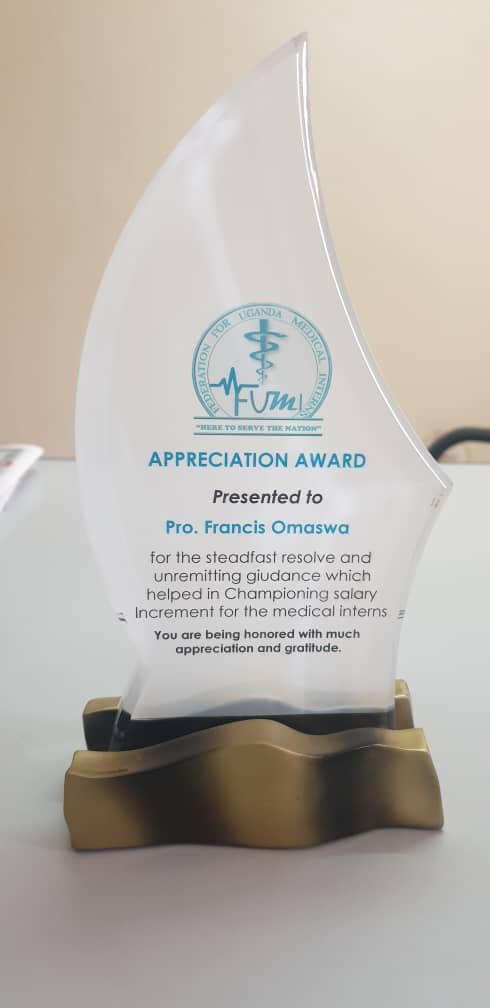
After the completion of one year of internship at the various hospitals in Uganda, the newest batch of Ugandan doctors to complete internship were hosted to a dinner by the Federation of Ugandan Medical Interns (FUMI) on March 25, 2022.
During the dinner, FUMI recognised individuals and institutions that supported them.
The African Center for Global Health and Social Transformation (ACHEST) received a Certificate of Appreciation, and the ACHEST Executive Director Prof. Francis Omaswa received an appreciation Award in plaque.
ACHEST has for over three years held induction courses for newly qualified health professionals in Uganda including doctors, nurses, and pharmacists.
The objective of the course is to enable the young health professionals to be conversant with the Ugandan health system and the Ministry of Health Vision and Mission; to understand the basics of government procedures and rules and quality assurance in the health care system.…
It also ensures that interns are prepared to work in the Ugandan health system and understand the referral system, job market, career progression and postgraduate training; and how to take good care of themselves.
In June 2020, the induction course won international recognition during the Health Workforce Resilience awards organized by Human Resources for Health 2030(HRH2030) Program
Prof Omaswa was recognized for guiding the Federation as they engaged the government of Uganda to raise their salaries, improve working conditions and also address unemployment of new graduated.Commenting on the two awards, Prof. Omaswa remarked: “ Young professionals need support so that they feel loved and cared for by senior colleagues. They will do the same when they become leaders. The profession prospers and the public enjoy better services.”
